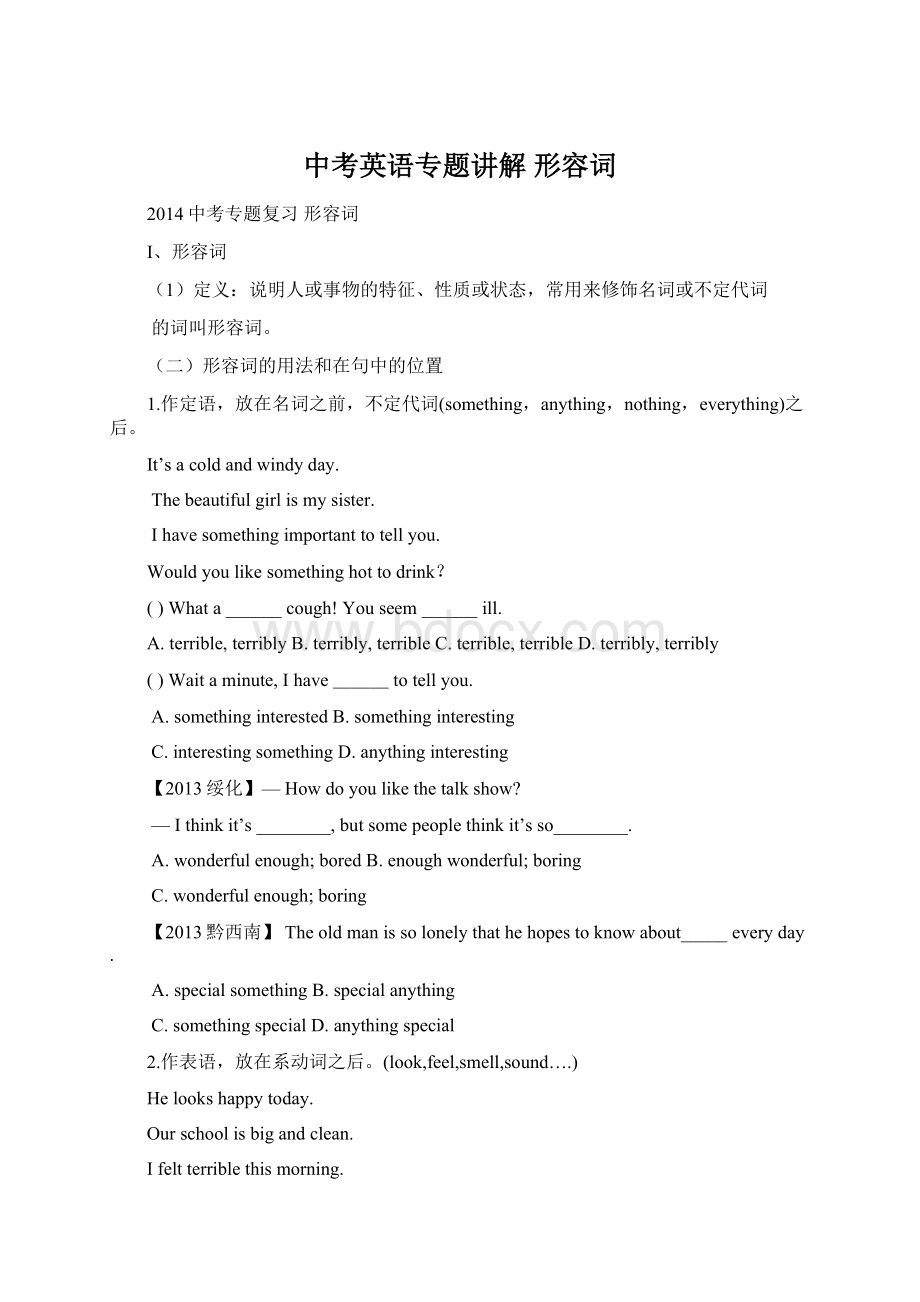中考英语专题讲解 形容词.docx
《中考英语专题讲解 形容词.docx》由会员分享,可在线阅读,更多相关《中考英语专题讲解 形容词.docx(17页珍藏版)》请在冰豆网上搜索。

中考英语专题讲解形容词
2014中考专题复习形容词
I、形容词
(1)定义:
说明人或事物的特征、性质或状态,常用来修饰名词或不定代词
的词叫形容词。
(二)形容词的用法和在句中的位置
1.作定语,放在名词之前,不定代词(something,anything,nothing,everything)之后。
It’sacoldandwindyday.
Thebeautifulgirlismysister.
Ihavesomethingimportanttotellyou.
Wouldyoulikesomethinghottodrink?
()Whata______cough!
Youseem______ill.
A.terrible,terriblyB.terribly,terribleC.terrible,terribleD.terribly,terribly
()Waitaminute,Ihave___totellyou.
A.somethinginterestedB.somethinginteresting
C.interestingsomethingD.anythinginteresting
【2013绥化】—Howdoyoulikethetalkshow?
—Ithinkit’s________,butsomepeoplethinkit’sso________.
A.wonderfulenough;boredB.enoughwonderful;boring
C.wonderfulenough;boring
【2013黔西南】Theoldmanissolonelythathehopestoknowabout_____everyday.
A.specialsomethingB.specialanything
C.somethingspecialD.anythingspecial
2.作表语,放在系动词之后。
(look,feel,smell,sound….)
Helookshappytoday.
Ourschoolisbigandclean.
Ifeltterriblethismorning.
()Jimis______atallhislessons.AndI'msurehe'lldovery_____intheexams.
A.well,goodB.good,wellC.well,wellD.good,good
()Thiseggsmells_______,thoughitlooksallright.
A.goodB.wellC.badD.badly
3.作宾语补足语,放在宾语之后。
Ifindithardtotravelaroundthebigcity.
Youmustkeepyoureyesclosed.
4.某些形容词放在定冠词之后,变成名词,表示一类人。
常见的形容词有:
dood/bad,rich/poor,young/bad,deaf/blind,black/white,living/dead等
Theyoungshouldbepolitetotheold.
Therichshouldhlepthepoor.
5.表示长、宽、高、深及年龄的形容词,应放在相应的名词之后。
【注】在英语中,表示事物的长、宽、高、深等时,主要有两种表达方式:
结构:
“基数词+单位名词+形容词(long,wide,tall,deep等)”。
如果数词超过1,单位名词要用复数形式。
【注】单位词有:
meter;foot;inch;kilogram等
YaoMingisover2meterstall.
Theriveris50meterswide.
Howlongistheriver?
It’sabouttwohundredmetreslong.
6.只能作表语的形容词:
afraid;alone;asleep;awake;alive;well健康的;ill;frightened
Themanisill.(正)
Theillmanismyuncle.(误)
7.只能作定语的形容词:
little小的;only唯一的;wooden木质的;woolen羊毛质的;elder年长的
MyelderbrotherisinBeijing.(正)
Mybrotheriselder.(误)
8貌似副词的形容词:
lonely;friendly;lively;lovely
()Thetwinsaretogethermostofthetime.Sotheyneverfeel___.
A.aloneB.lonelyC.happilyD.friendly
(三)、形容词的排列顺序
当名词被多个前置形容词修饰时,形容词之间有一个先后顺序问题。
一般规则为:
(限定词)→一般描绘性形容词→表示大小、长短、高低的形容词→表示年龄、新旧的形容词→表示国籍、地区、出处的形容词→表示物质、材料的形容词→(名词)。
Thereisafamousfineoldstonebridgenearthevillage.
(四)、有一些表示情感的表语形容词后可接动词不定式
be+
glad,happy,pleased
+todosth.
sorry,sad,sure,kind
ready,afraid,able
easy,difficult
I’mverysadtohearthebadnews.
(五)形容词的构成:
(1)常见名词变形容词的方法:
名词
构成方法
意义
举例
表示天气的名词
-y
多…….的
cloud–cloudywind-windysun-sunnyrain-rainysnow-snowy
表示方位的名词
-ern
……的方位
west–westerneast–eastern
south-southernnorthern
表示称谓的名词
-ly
……般的
friend–friendlyweek-weeklyday-daily
表示时间的名词
-ly
每…..的
week–weeklyday–daily
表示物质的名词
-en
……制成的
wood–woodengold–golden
表示情感的名词
-ful
-y
-less
……的
无……的
care-carefuluse–useful
beauty-beautifulhope-helpful
luck-luckynoise-noisyhealth-healthy
hope-hopelesscare-careless
home-homelsee
表示大洲和国家的名词
-n
…...的
……的人
Asia–AsianCanadia-Canadian
America-American
【2013莆田】TheInternetisreally___tous.Wecaneasilyfindinformationonit.
A.boringB.usefulC.Interesting
【2013日照】Maryisso________—shecomestoyouwheneveryou’reintrouble.
A.usefulB.carefulC.thankfulD.Helpful
【2013济南】MyunclelosthisIDcardyesterdaymorning.______,aschoolboyfounditand
sentitbacktohimintheafternoon.
A.LoudlyB.ClearlyC.NearlyD.Luckily
(2)复合形容词:
指由几个词共同组成,并起形容词作用的词。
主要用作定语,不作表语。
结构:
数词+名词+(形容词)
fifteen–year-oldadj.十五岁的作定语用(复合形容词)
【注】复合形容词的特点:
⑴各词之间有连字符号
⑵名词用单数
afifteen–year-oldboy15岁的男孩
【2012黑龙江黑河市】A_____girlnamedDongXinyilookedafterherdisabledfather.
A.three-year-oldB.three-years-oldC.threeyearsold
(六)、使用形容词的几个常用句型.
1.“Itis+adj.+forsb.todosth.表示;对某人来说做某事是怎样的
这一句型中常用的形容词有:
dangerous(危险的),
difficult(困难的),
easy(容易的),
hard(艰难的),
important(重要的),
impossible(不可能的),
interesting(有趣的),
necessary(必要的),
pleasant(舒适的),
safe(安全的),
useful(有益/用的)等,
ItisimportantforTomtoworkonhisfather’sfarm.
It’sverynecessaryforstudentstolistentoteacherscarefully.
2.Itis+adj.+ofsb.todosth..意为:
某人做某事是怎样的。
这一句型中常用描述行为者的性格、品质的形容词有:
careful(细心的),
careless(粗心的),
clever(聪明的),
foolish(愚蠢的),
good(好的),
kind(友善的),
lazy(懒惰的),
nice(友好的),
polite(有礼貌的),
right(正确的),
wrong(错误的)等.
It’sverykindofyoutohelpme.
3.表示能力和意志的形容词,
ready(乐意的,有准备的),able(有能力的),sure(一定),certain(一定)等常接不定式。
LeiFengisalwaysreadytohelpothers.
Heissuretogettoschoolontime.
4、—ing形容词和—ed形容词
1).—ing形容词的特点:
表示主动的意义,多指事物对人的影响,一般修饰事物。
2).—ed形容词的特点:
表示被动意义,多指人对事物的感受,主语一般是人,
surprise---surprising/surprisedinterest---interesting/interested
excite---exciting/excitedtire---tiring/tired
【2013安顺】Heoftendrinkstwocupsof______waterwhenhecomesback.
A.boilingB.boilC.boiledD.boils
【2013青岛】Itis__thatMr.Guosailedacrosstheworldbyhimself___withinabout130
days
A.terrified,successfulB.scary,successfully
C.amazing,successfullyD.convincing,successful
(7)含有形容词的固定短语:
1.be+形容词+at
begoodat善于,擅长于beinterestedin对……感兴趣
2.be+形容词+about
beworriedabout担忧
3.be+形容词+for
bereadyfor为……作好准备befamousfor以……而著名begoodfor对.......有益
4.be+形容词+in
beinterestedin对……感到举bestrictin(with)(对工作、对人)严格要求
beweekin在.......方面差
5.be+形容词+of
becarefulof当心,注意beafraidof害怕……bein(great)needof(很)需要
befulllof充满befondof喜欢....beproudof对.......感到自豪
betiredof对.......感到厌烦besureof对.......有把握
6.be+形容词+with
becoveredwith被……复盖beangrywithsb.生(某人)的气
bepleased(with)对……感到高兴(满意)bestrictwith对......严格
bebusywith忙于bepatientwith对.......有耐心
bepopularwith受.......欢迎besatisfiedwith对……感到满意
7.be+形容词+to
beabletodosth.能够做……begladtodosth.很高兴做……
befriendlyto对......友好bepoliteto对......有礼貌
(8)易混形容词辨析:
1.good/fine/nice/well
Ⅰ.good是含义最广的形容词,表“好的质量”,“好的品质”。
等意思。
1Lucyisagoodgirl.
2Theseeggsaregood(指鲜人品质)。
Ⅱ.fine侧重于“质量的精细”,“身体健康”,还可以表示“天气晴朗”等。
如:
1Thisisafinehouse.
2Howareyou?
I’mfine,thankyou.
3It’safinedayforwalk.这是一个散步的好天气。
Ⅲ.nice指从外表上的“好看、漂亮”。
取悦于人的感觉。
也可指“(对人)友好和蔼”如:
1It’sanicewatch,butit’snotagood/fineone.这块表看上去不错,但却不是一块好表。
2It’sveryniceofyou.你真太好了。
3Theyarenicemooncakes.这都是美味的月饼。
Ⅳ.well是副词。
表干/做得“好”,修饰动词。
也可作表语,指身体好。
如:
1Welldone!
干得好!
2I’mwell.我好了。
2.lone,lonely,alone
I.lone“孤独的,寂寞的,无依无靠的“
II.lonely“孤单的,寂寞的”,但更强调指渴望陪伴的孤独感受。
lonely①指人孤独的,寂寞的,强调主观感受;②也可指某个地方是荒凉的
III.alone意为“单独的,一个人的”,表示客观上无人陪伴,一般只作表语
alone=byoneselfadj.单独的,指无人陪伴的客观事实,不带感情色彩。
Heoftenwalksalonetohome.
()①Theoldmanlives___,butheneverfeels____.
A.alone;lonelyB.lonely;aloneC.alone;aloneD.lonely;lonely
II、形容词的比较级、最高级
1.分类:
形容词有原级,比较级(“更加/比较….的”),最高级(“最….的”).
原级变为比较级和最高级有规则变化和不规则变化两种。
(A).规则变化:
单音节和少数双音节形容词的规则变化.
(1).一般在形容词词尾直接加er构成比较级,直接加est构成最高级,
tall→taller→tallest,long→longer→longest,short→shortest
(2).以不发音的字母e结尾的形容词,只需加r构成比较级,加st构成最高级。
nice→nicer→nicest,fine→finer→finest,large→larger→largest
(3).以辅—元—辅结尾的重读闭音节形容词,先双写这个辅音字母,
再加er构成比较级,加est构成最高级,
big→bigger→biggest,hot→hotter→hottest,red→redder→reddest
()Itwas___yesterdaythantoday.
A.HotB.hoterC.hotterD.thehottest
(4).以辅音字母+y结尾的形容词,先把y变为i,
再加er构成比较级,加est构成最高级,
busy→buier→busiest,easy→easier→easiest.
(5)部分双音节形容词和多音节形容词
在原级前加more构成比较级,在原级前加most构成最高级,
tiring→moretiring→mosttiring,
relaxing→morerelaxing→mostrelaxing,
beautiful→morebeautiful→mostbeautiful
(B)不规则变化:
原级
比较级
最高级
good好的
better更好的
best最好的
well好;(身体)好的,
bad,badly糟糕的,糟糕地
worse更糟糕的,更糟糕地;(身体)更不舒服的
worst最糟糕的,最糟糕地;(身体)最不舒服的
ill(身体)不舒服的
many许多的(可数)
more更多的;更
most最多的;最
much许多的(不可数);非常
little少的
less更少的
least最少的
far远的;远地
farther更远的;更远地
farthest最远的;最远地
further进一步的(地)
furthest最深刻的(地)
2.形容词的原级、比较级和最高级的用法:
一、原级的用法
1.只能修饰原级的词,very,quite,so,too,rather
Heistootiredtowalkon.
Theweatherlooksratherbad.(天气看上去相当糟)
Iamsohappy!
(我是如此的快乐)
()Thegirlwas___afraid___shethrewherbagaway.
A.so,thatB.too,toC.too,thatD.enough,to
()Thetwofriendswere_____pleasedtoseeeachotherthattheyforgoteverything.
A.soB.tooC.veryD.much
()Let'sgooutforsuppernow.I'mvery___.
A.hungryB.angryC.tiredD.thirsty
()Itisvery___tolistentohim.
A.interestedB.interestingC.interestedinD.interest
【2013泉州】—Whatshouldwedotoreducefoodwaste?
—Inarestaurantonlyorderas____asweneedandtrytoeatitup.
A.muchB.moreC.most
2.原级常用的句型结构
句子使用原级的两大标志
a.当句中含有as(so)…as…时,句子一般使用原级.
(肯定句中只能用as,而否定句中可用so或as)
(1)A=B-----A+谓语动词+as+adj/adv的原级+as+B表示“A和B一样”
☆表示两者之间没有差别:
TomisasoldasKate.
TomistwiceasoldasKate.
HisEnglishisasgoodasyours.
()Idon'tthinkEnglishis___Chinese.
A.asimportantasB.notimportantasC.notsoimportantD.importantas
【2013玉林】LiuYingisgoodatsinging.Shesings______thefamoussinger,CoCo.
A.aswellasB.asgoodasC.asbetterasD.asthebestas
(2)A<B---A+谓语动词+not+as/so+形容词原级+as+B表示“A不如B…”
☆表示第一个人比不上第二个人:
Thisroomisnotas/sobigasthatone.
b.当形容词前含有quite,so,too,very等副词时,句子一般用原级,
Heistootiredtowalkon.
Iamveryhungrynow,butIdon’twanttoeat.
二、形容词比较级的用法
1.可以修饰比较级的词.
much,alot,far,…的多alittle,abit,…一点儿even甚至,still仍然
讲述两者有差异,第一个人物超过第二个人物时,用比较级。
基本句型:
A+谓语动词+(much/alittle/even/still)+形容词/副词比较级+than+‘B’+….